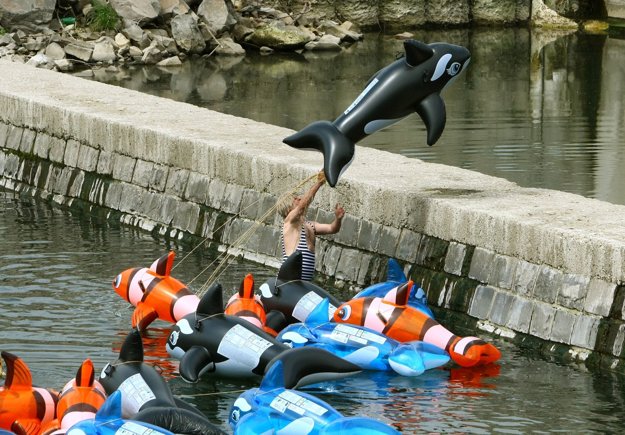Malé vodné elektrárne ničia rieky na Slovensku
V mnohých krajinách sveta, vrátane Čiech, začínajú pomáhať riekam, aby opäť získali svoju prirodzenú podobu. Na Slovensku zatiaľ rieky ešte viac betónujeme.
Kancelária verejného ochrancu práv skúmala začiatkom roka 2017 povoľovacie konania v prípade malých vodných elektrární (MVE). Tím ombudsmanky Jany Dubovcovej zistil, že úrady nedôsledne vyhodnocujú ich vplyv na životné prostredie. Neberú do úvahy, ak je viac elektrární postavených pár kilometrov od seba a konajú chaoticky. V povoľovacích konaniach MVE dochádza k porušovaniu základných práv a slobôd týkajúcich sa práva na priaznivé životné prostredie, práva na včasné a úplné informácie o stave ŽP, ako aj práva na súdnu a inú právnu ochranu. „Neodborné a v niektorých prípadoch protiprávne konanie orgánov verejnej správy viedlo k nedostatočnému posúdeniu vplyvov stavieb na životné prostredie a následne k zníženiu kvality životného prostredia a biodiverzity,“ konštatuje kancelária ombudsmanky.
Škandalózny je prípad MVE Tekov, kde stavba bola napokon povolená napriek závažným námietkam zo strany ochrany prírody a krajiny, ale aj napriek upozorneniu Slovenských elektrární, a. s., že stavba sa plánuje realizovať v blízkosti výpustu odpadových vôd z Jadrovej elektrárne Mochovce!
Koncom marca 2017 preto zástupcovia iniciatívy Za živé rieky na Ministerstvo životného prostredia SR (MŽP SR) odovzdali petíciu s 20 tisíc podpismi, v ktorej žiadajú lepšiu ochranu riek. Ako informovala členka petičného výboru Martina Paulíková, od ministerstva požadujú vypracovanie nových a voči prírode šetrných plánov hospodárenia s vodou, zníženie znečisťovania vôd a obmedzenie bezohľadných zásahov do tokov, ktoré natrvalo znehodnotia prírodný charakter riek, ekosystémov a krajiny. Petícia žiada spracovanie novej vodnej politiky Slovenska tak, aby bola “starostlivo uvážená a spracovaná na základe najlepších dostupných vedeckých poznatkov, za účasti zainteresovaných subjektov a v duchu spolupráce”. Hospodárske využívanie nadradené nad ochranu vôd, totiž spôsobuje z dlhodobého hľadiska vážne ohrozenie vôd. Ďalší člen petičného výboru Mikuláš Huba vyjadril obavy nad živelnou výstavbou MVE. Zdôraznil, že využívanie všetkých profilov, ktoré sú z hydroenergetického hľadiska síce vhodné na výstavbu MVE, ale zo všetkých ďalších hľadísk nevhodné, je v rozpore s európskymi smernicami o vode a o biotopoch. „Sme svedkami obrovskej arogancie moci úradníkov v štátnej správe na jednej strane ako aj moci peňazí, keď záujem developera je uprednostnený pred záujmom verejnosti,“ vyhlásil Huba. Ochranár Ján Topercer je presvedčený, že riečnym ekosystémom chýba integrovaný a systémový manažment, výstavbou MVE, protipovodňovými opatreniami, znečisťovaním či výrubom stromov sa zaoberajú rôzne, vzájomne nespolupracujúce úrady.
MŽP tvrdí, že už sprísnilo a stransparentnilo celý proces posudzovania pre MVE, ako v reakcii uviedol hovorca envirorezortu Tomáš Ferenčák, Aktualizácia koncepcie využitia hydroenergetického potenciálu vodných tokov SR do roku 2030 stanovila jasné pravidlá, kedy malá vodná elektráreň podlieha procesu posudzovania.
„Každý nový projekt výstavby, nad výkon 0,1 MW, po novom podlieha posúdeniu vplyvov na životné prostredie. To znamená, že budú posudzované aj možné vplyvy projektu na riečne ekosystémy. Následne, aj na základe tohto posúdenia, príslušný orgán výstavbu v konkrétnom mieste povolí alebo zamietne,“ zdôraznil Ferenčák, podľa ktorého výstavba MVE v chránených územiach či lokalitách Natura 2000, kde je predmet ochrany viazaný na vodu, je po novom vylúčená.
Podľa ochranárov sa sprísnenie v skutočnosti týka iba malého počtu MVE. Väčšina MVE už získalo rozhodnutie o výstavbe, keďže pre ich výstavbu nebolo potrebné posudzovať ich vplyv na životné prostredie.
Location
Slovensko, Nitriansky kraj, okres Levice, Tekov
Environmental impact
- Water pollution
- Land degradation (e.g. drought, soil contamination, erosion and desertification)
- Biodiversity loss – Ecosystem destruction
- Depletion of natural resources (fossil and mineral, forest, water, etc)
- Hazards related to extreme weather events – natural disaster
- Alteration of landscape aesthetics and built heritage
Ethical/ legal issues
- Life and personal security
- Health and well-being
- Personal and social development, economic progress and innovation
- Democratic participation to decision-making on community and national affairs
Information sources & materials
Online books and newspaper, magazine, encyclopedia, or blog articles
https://www.etrend.sk/trend-archiv/rok-2017/cislo-10/ked-su-male-vodne-elektrarne-vyborny-kseft.html
https://dennikn.sk/720802/voda-je-zivot/
https://www.aktuality.sk/clanok/422295/odhalenie-za-elektrarnou-sa-skryvali-ludia-blizki-kalinakovi/
http://www.teraz.sk/ekonomika/envirorezortmame-375-profilovkde-moz/237467-clanok.html
Contributor(s)
Štefan Szabó, Silvia Szabóová, SOSNA Association, Slovakia



Home › Forums › Small hydropower plants destroy rivers in Slovakia